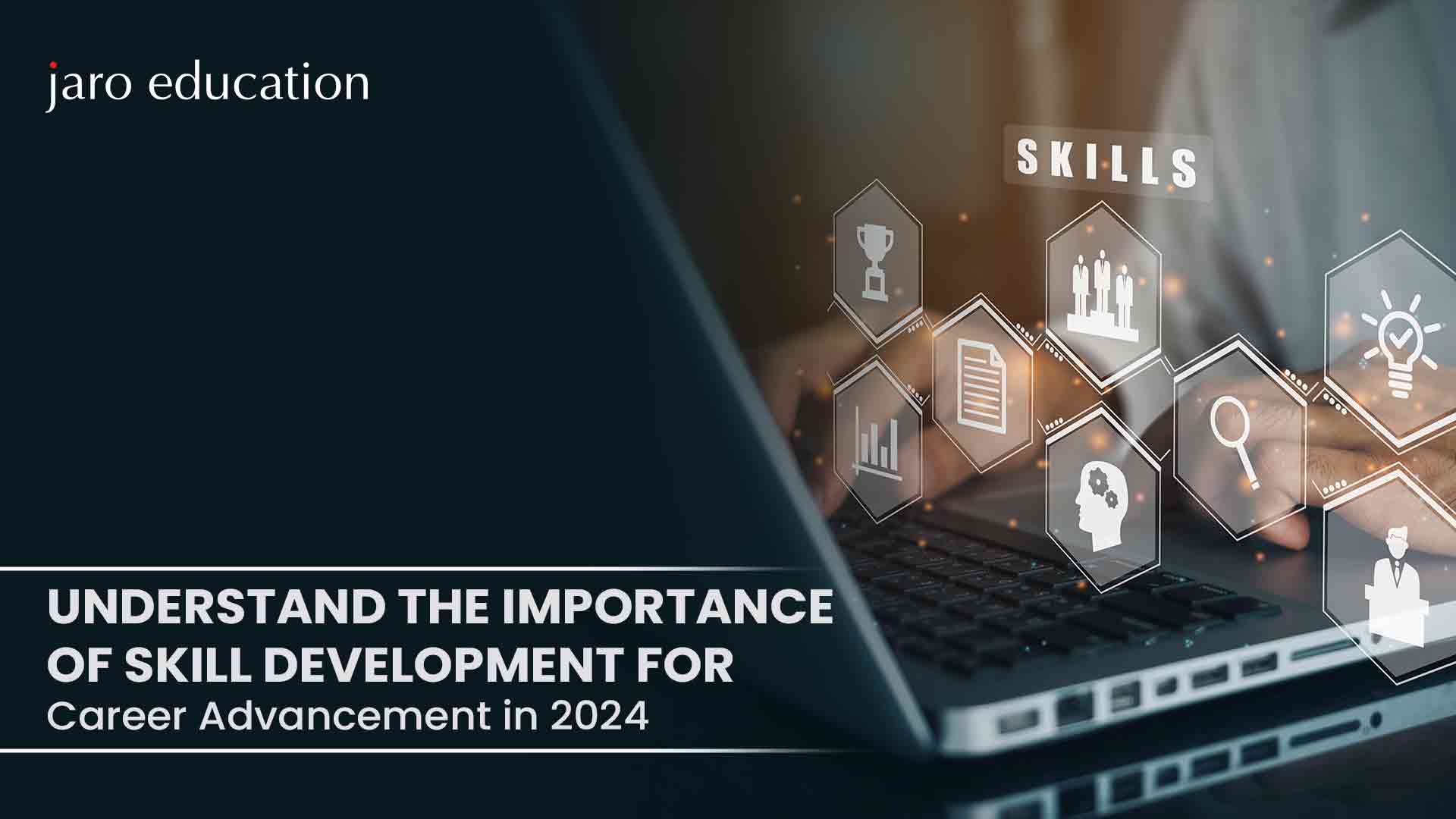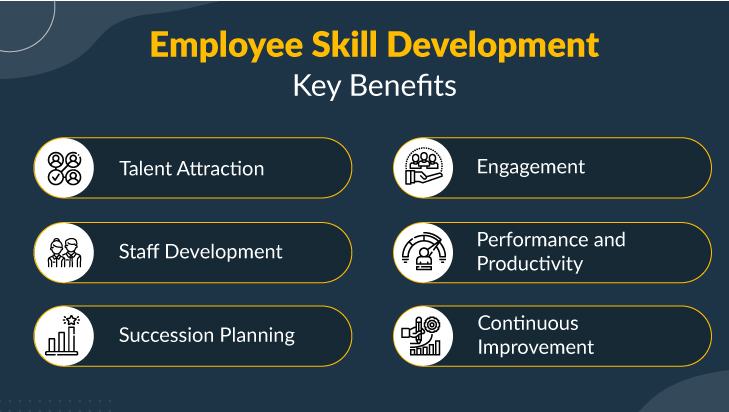
- jaro education
- 24, February 2024
- 10:00 am
As you progress toward a new job or career path, focus on essential skills is equally important as having the right education and work experience. These skills, especially related to the workplace and interpersonal interactions, are crucial.
Surveys and studies consistently show that employers in 2024 prioritize these skills. According to a LinkedIn study on learning and development, 64% of professionals in this field plan to help their current employees learn new skills to keep up with changing job requirements.
The development of skills is thus a fundamental aspect of preparing oneself for a career and fostering personal growth. Adding those skills to your resume will grab the attention of employers and make your position firm. This blog will elaborate on the essentials of skill development, provide guidance on initiating the process, and offer insights on how to articulate these skills on your resume.
What is Skill Development
Skill development is the process that involves enhancing specific abilities to increase efficiency and effectiveness in task performance. In professional settings, three primary types of skill development exist:
Upskilling: Enhancing proficiency in existing job responsibilities.
Table of Contents
Cross-skilling: Acquiring new skills relevant to one’s current role.
Reskilling: Learning novel skills to transition into a different job role.
It’s not mandatory to participate in a workplace initiative for skill development. Whether you are a college student pursuing a degree, dissatisfied with your current job, aiming for a position in a new company, or aspiring for a promotion, you can independently foster skill growth. Additionally, personal motivations, such as boosting confidence or refining a cherished hobby, are valid reasons to invest in skill development.
Benefits of Skill Development
Recognizing that knowledge alone doesn’t ensure skill acquisition; implementation and application are essential. While theoretical knowledge provides a conceptual framework, practical knowledge offers real-world exposure, allowing the construction of a purposeful life.
Skill development offers numerous benefits:
Fosters Self-awareness
Initiating skill development involves assessing the disparity between the present and desired future situations and helps in finding strong points and areas needing improvement. In busy lives, self-reflection is often neglected, making skill development a valuable tool for heightened self-awareness.
Drives Career Progression
Devoting time to refine skills contributes to achieving personal career objectives, such as securing a promotion or becoming an expert in a specific area. You can use these skills in your current job or learn more to qualify for jobs in other fields or industries.
Provides a Competitive Edge
Continuous skill development is crucial to thriving amid changes in industries, rules, and regulations. Staying abreast of these changes is vital for sustained success, making skill development an indispensable aspect of professional growth.
Enhances Productivity and Morale
Skill development plays a pivotal role in boosting confidence and eliminating self-doubt. Elevated motivation levels lead to increased efficiency and effectiveness, resulting in heightened job satisfaction.

*selecthub.com
Why Skill Development is Important in India
The developmental trajectory of a nation heavily relies on the youth of India, constituting a pivotal force. Armed with appropriate skills and effective training, young Indians possess the potential to significantly contribute to the economic growth of their country. However, there is a growing apprehension regarding the insufficient progress in skill development among Indian youth. Here are some reasons highlighting the significance of skill development for the youth in India:
1. The 21st century is characterized by the prominence of skilled individuals. In the context of a globalized economy, India’s ability to compete with developed nations hinges on having a skilled workforce. Unfortunately, our education system has not adapted swiftly enough to the evolving demands, resulting in the production of graduates who lack employability skills.
2. This is where the importance of skill development becomes apparent. By imparting the necessary skills to our youth, we can enhance their employability, preparing them to navigate the challenges of the global economy. Furthermore, the increasing demand for skilled workers within the country, driven by economic growth and the establishment of more companies in India, underscores the domestic relevance of skill development.
3. Consequently, the significance of skill development for Indian youth is undeniable. It not only enhances their prospects for success in their careers but also contributes to the overall economic advancement of the nation.
Government Initiatives for Skill Development
- Pradhan Mantri Kaushal Vikas Yojana (PMKVY): Launched in 2015, the flagship PMKVY scheme is designed to offer short-term training, skill development through ITIs, and apprenticeship programs. Since its inception, the government has successfully trained over 10 million individuals through this initiative.
- SANKALP and STRIVE: Complementing PMKVY, the SANKALP program targets district-level skilling ecosystems, while the STRIVE project aims to enhance the performance of Industrial Training Institutes (ITIs), both constituting significant interventions in the skilling landscape.
- Cross-Ministry Initiatives: Approximately 40 skill development programs, spearheaded by 20 central ministries/departments, have been implemented. The Ministry of Skill Development and Entrepreneurship alone has contributed to 55% of the overall skilling achievements. These initiatives collectively have trained nearly four crore individuals in various traditional skills programs since 2015.
- CSR Expenditure in Skilling: Since the enactment of mandatory Corporate Social Responsibility (CSR) spending under the Companies Act, 2013, Indian corporations have invested over ₹100,000 crores in diverse social projects. Of this, approximately ₹6,877 crores have been allocated to skilling and livelihood enhancement projects, with Maharashtra, Tamil Nadu, Odisha, Karnataka, and Gujarat emerging as the top five recipient states.
- TEJAS Initiative for Skilling: A recent addition to the skilling landscape is the TEJAS initiative, unveiled at the Dubai Expo 2020. This Skill India International Project focuses on training overseas Indians, providing certification, facilitating overseas employment, and preparing the Indian workforce to meet skill and market demands in the UAE.
As the workplace landscape undergoes rapid transformation, driven by the encroachment of Artificial Intelligence (AI) into various sectors, essential workplace success skills have transitioned from being ‘good-to-have’ or ‘soft’ skills to becoming pivotal drivers of growth. These skills are integral in mitigating the threats posed by AI to traditional job roles, spanning from accounting to law.
Important Skill Sets for Personal and Professional Growth
Individuals possess or acquire skills through training and education, crucial for diverse goals. While skills vary, some universally applicable ones include:
Communication
Proficiency in writing, reading, listening, and speaking facilitates information understanding and idea expression. Effective communication aids in delegating tasks, crucial for managerial success. Good communicators maintain clarity, utilizing a positive tone as per the context.
Interpersonal
Interpersonal or social skills encompass verbal and nonverbal behaviors during interactions. This skill influences relationship-building and impression-making in social settings. It includes qualities such as empathy, patience, motivation, and dependability.
Adaptability
Adaptability involves the ability to adjust swiftly to new situations and ideas. For example, as a professional with adaptability, one can sustain performance even amid changes in work partners. Adaptable individuals excel in managing change, collaborating effectively with diverse personalities, and thriving in varied environments.
Integrity
Integrity denotes a commitment to truthfulness and ethical action, even in challenging circumstances. It is a crucial quality, as individuals who consistently demonstrate honesty gain trust. Upholding one’s integrity and adhering to core values contribute to building a positive reputation within an industry, fostering opportunities for career advancement.
Self-Confidence
Self-confidence is a genuine belief in one’s abilities, actions, and decisions. It entails a robust yet well-founded assurance in one’s capability to complete tasks and achieve positive outcomes. Those with self-confidence are more inclined to undertake new challenges and pursue ambitious goals, guided by the belief in their potential for success.
Integrity
Integrity denotes a commitment to truthfulness and ethical action, even in challenging circumstances. It is a crucial quality, as individuals who consistently demonstrate honesty gain trust. Upholding one’s integrity and adhering to core values contribute to building a positive reputation within an industry, fostering opportunities for career advancement.
Organization
Organizational skills extend to maintaining an orderly physical or digital space, future planning, scheduling, and task prioritization. Efficient organizers save time, meet deadlines, and enhance work efficiency.
Problem-Solving
Problem-solving capacity involves adeptly handling unexpected challenges. Unplanned situations are common across industries, requiring professionals to stay composed, analyze scenarios, evaluate options, and identify optimal solutions.
Effective Tips for Skill Development for Career Advancement
Explore 7 effective ways to enhance your skills and knowledge:
Enroll in Valuable Courses
Consider professional development courses to broaden your skill set, acquire new knowledge, or earn academic credit for degree advancement. Opt for online courses for flexibility and affordability, but scrutinize instructor credentials, read reviews, and review syllabus before enrollment. Seek courses from vendor-taught classes, traditional universities, and training institutions.
Furthermore, multiple tier-1 business schools provide valuable courses online. Here are some courses you should explore to upskill:
- Accelerated General Management Programme by IIM Ahmedabad
- Programme on Strategic Management by IIM Ahmedabad
- Executive Programme in Healthcare Services Management by IIM Ahmedabad
Utilize Online Resources
Leverage the vast resources on the internet for free information and education. Attend educational webinars, follow industry experts on blogs and social media, and stay updated on trends through industry news sites and forums. Sign up for news alerts, like Google Alerts, or streamline your news using an RSS feed service like Feedly.com.
Participate in Professional Events
Attend local seminars, forums, or workshops hosted by companies, business associations, and professional groups. These events provide direct access to industry experts and valuable insights into growth and development. Use such opportunities to network, share ideas, and gain fresh perspectives from colleagues.
Engage in Online Networking
Recognizing the significance of networking, especially as an independent consultant, use LinkedIn to connect with influential individuals in your field. Leverage social media platforms such as Fiverr, Upwork and others to promote your services, connect with industry experts, and maintain relationships with past and present clients.
Embrace Technological Advancements
In the swiftly evolving landscape of technology, maintaining a competitive edge demands staying abreast of the latest developments. Focus on technologies directly relevant to your work and utilized by your clients. Subscribing to updates from technology creators keeps you informed about the latest enhancements. Additionally, explore new technologies beneficial for your business, such as more efficient time and expense tracking software. Follow and learn from experts in these technologies to stay updated on new features.
Explore White Papers and Case Studies
Prominent companies, consulting organizations, agencies, and think tanks routinely release white papers and case studies on industry trends, often available for free download. Keep yourself informed about industry and business trends by leveraging these valuable resources.
Cultivate In-Demand Skills
Avoid stagnation, even if your business is thriving or your expertise is well-established. Companies perpetually adapt to market demands, actively seeking specific skills to achieve distinct business objectives. Review job descriptions at current or desired client organizations to identify new skills required. Develop a plan for acquiring these skills through continued education, online courses, or practical implementation in ongoing projects.
Skill Development Strategies
Skill development is the process of improving specific skills to be more efficient and effective when you perform a task. It can help you achieve your career goals by enhancing your competencies and increasing your value to employers. Here are some strategies for skill development that you can use to advance your career:
- Set clear and realistic goals for yourself. Identify what skills you need to improve or acquire to reach your desired position or role. You can use online platforms such as Jaro Education to assess your current skills and explore career options.
- Find a mentor or a coach who can guide you and provide feedback on your progress. A mentor can be someone in your field, industry, or organization who has the experience and knowledge that you aspire to have. A coach can be a professional or a peer who can help you develop specific skills or overcome challenges.
- Seek feedback from others on your strengths and weaknesses. Feedback can help you identify your areas of improvement and recognize your achievements. You can ask for feedback from your manager, colleagues, clients, or customers. You can also use online platforms like LinkedIn or Glassdoor to get feedback from your network or industry peers.
- Review job descriptions for positions you want. Job descriptions give you an idea of what skills and qualifications employers seek in your desired role. You can use job boards like Indeed or Monster to search for jobs that match your interests and goals. Apart from that, you can also use online tools like SkillSyncer or Jobscan to compare your resume with job descriptions and identify skill gaps.
- Sign up for an online degree program or take courses in fields related to your career. Online learning is a great way to learn new skills or update the ones you already have. There are many courses, certificates, and degrees available from well-known institutions or platforms for you to choose from.
- Participate in job shadowing, internships, or volunteer opportunities. These are practical ways to gain hands-on experience and learn from others in your field or industry. You can also expand your network and showcase your skills to potential employers and find opportunities through your employer, professional associations, or online platforms like VolunteerMatch or Internships.com.
These are some of the strategies that can help you develop your skills and grow your career. Remember that skill development is a continuous and lifelong process that requires dedication, motivation, and curiosity.
Conclusion
To beat the ongoing competition and stand out in the professional space, one has to stay up-to-date with the in-demand skills and knowledge as per their industry requirements as skill development plays a crucial role in fostering economic growth, ensuring social stability, and contributing to individual success. So, take action today to build a better career tomorrow. To get a deep insight into how you can begin your upskilling journey, contact Jaro Education.









